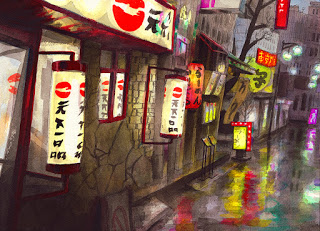Most Cultural Currents readers may know San Francisco-based artist and writer, Paul Madonna, as the creator of the series All Over Coffee (San Francisco Chronicle 2004-2015), and All Over Coffee (City Lights 2007), and Everything is its own reward (City Lights 2011; winner of the 2011 NCBR Recognition Award for Best Book).
Late last year, we examined is newest work, Close Enough for the Angels (2016), which represents something of a departure. We had just paid a visit to a local gallery (now closed) to view a curated show featuring his illustrations and text images. Rare and limited first editions were also available.
This bit of gallery copywriting puts it into perspective:
As a contemporary take on the classic form of the illustrated novel, Close Enough for the Angels features over 100 lush and haunting drawings paired with a full-length plot driven story about Emit Hopper, who, twice a one-hit wonder, is thrown back into the limelight twenty years after faking his own death. It explores the question, what happens when your life is taken over by luck?
Cultural Currents: Which artists and writers have inspired your work?
Paul Madonna: Over the years I’ve had a lot of influences. I tend to only think of those who are right in front of me at the moment. But some big ones for me over the years have been Raymond Pettibon, Raymond Chandler (I seem to like the Ray’s), Leonard Cohen, Henry Miller, Ed Ruscha.
CC: Any new discoveries in this regard? Someone completely unexpected?
Madonna: They’re all unexpected, really. I think influences appear when you need them. It happens a lot that I might see someone’s work, but it won’t grab me, then years later I’ll find myself working on a project that makes me think of them, so I’ll go and look them up and suddenly they’re the primary influence in my life. Haruki Murakami was like this. Many years ago I started to readKafka on the Shore, but wasn’t so into it and put it down. Then, years later, when I was developing my recent novel, a friend recommended Hard Boiled and the End of the World, and it was like a revelation. From there I read almost all of Murakami’s books, and found his storytelling style to be an enormous influence on my thinking.
CC: To what extent does the Bay influence your work?
Madonna: I think being around water is important. That on a subconscious, day to day level, it gives one a sense of being more alive. I think that part of what makes San Francisco amazing is that it’s a peninsula. We’re limited in how far we can expand, so we’re forced to maximize our space. It’s like the pressure that turns coal into a diamond. Without the water around us, we’d spread out and never get that extra, intensely unique, and necessary push.
CC: Our readers are typically those who use ferry transport for work and recreation. What are your impressions about this stately mode of transport?
Madonna: There’s something romantic about a ferry. As if traveling across the water can set you free from your life. Or, like how in movies when people are being chased by dogs they run through water to keep them from picking up their scent. I’ve never commuted regularly by ferry, though, and I can only guess that it might lose some of its romance when it becomes a necessity.
CC: Tell us something about Close Enough for the Angels.
Madonna: It’s an illustrated novel I worked on for six years. A full-length story about a former one-hit wonder who after twenty years is having a comeback. There’s a mystery to the book, and over 100 drawings from Japan, China, and Thailand.

